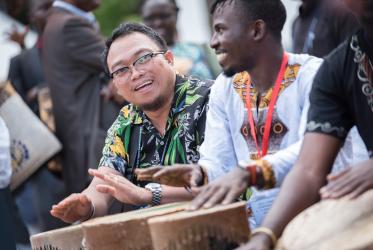Rev. Prof. Fundiswa Kobo from South Africa, Dr Sara Gehlin from Sweden, Deivit Montealegre from Argentina, and Pastor Britta Mann from Germany reflected on their experiences with past GETI cohorts in Busan and Tanzania. Rev. Prof. Dr Rudolf von Sinner and Rev. Prof. Dr Septemmy Lakawa gave lectures followed by breakout groups.
The program was moderated by Prof. Dr Esther Mombo.
“I got to experience the depth of the movement”
Dr Sara Gehlin was a doctoral student studying peace-building in the ecumenical movement when she enrolled in the GETI program in 2013. “When I came to Busan, being there made me understand much more deeply what I was working with,” she said.
Gehlin has since completed her studies and now teaches at University College Stockholm in Sweden. She has started a network for teachers in ecumenism in Nordic countries in which they discuss teaching and research, audit one another’s courses, and dream up resources they can create together for students of ecumenism.
According to Gehlin, “When you do not engage with the traditions of others in our education of theology, you focus very narrowly on your own tradition which can lead to fears,” adding that ecumenical education brings “about understanding, friendship and knowledge of each other.”
“We as emerging theologians have a voice that needs to be trained”
“We as emerging theologians have a voice that needs to be trained,” said Deivit Montealegre from the Canadian Council of Churches. Monealegre participated in the Busan GETI program in 2013 and has worked in the ecumenical education world since.
“GETI taught me to not quickly answer, just wait until teachers and students really struggle with the idea,” he said.
Montealegre is now pursuing a doctoral degree in theology, and said that GETI has also helped him build a network of thousands of people around the world, which is helpful in his pursuits.
“I went to Brazil for struggle, but remained there for love”
During his lecture on the Russia-Ukraine conflict, the Rev. Prof. Dr Rudolf von Sinner shared his own personal connection to Ukraine, having lived in Brazil for over 20 years, and having knowledge of Curitiba, a city in Brazil with a large Ukrainian population.
He began speaking about his own migratory journey leaving his home in Switzerland to moving to Brazil for his work in liberation theology in Brazil, and then meeting his wife. “I went to Brazil for struggle, but remained there for love,” he said. Von Sinner has discovered over his time that Brazil is diverse, accepting refugees and migrants from all over the world, and has more to offer than political struggles.
In the same vein, he spoke a message of love regarding the conflict in Ukraine. “Exclusion of the Russian Orthodox Church is not the solution,” he said. “This would be the real failure of ecumenism.”
Instead von Sinner says of true ecumenism, “We tend to stay together, to move together, to act together with fire in our belly and love in our heart.”








